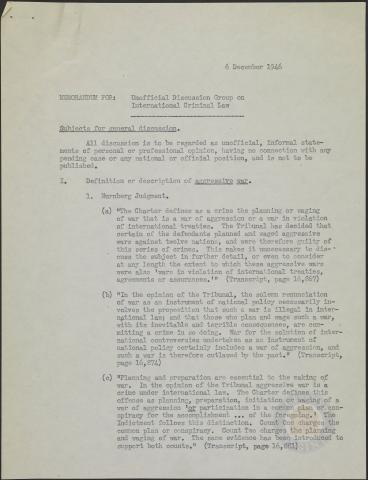
Page 2
| Parent | Proposed Group Conference on International Criminal Law |
|---|---|
| Date | 6 December 1946 |
| Language | English |
| Collection | Tavenner Papers & IMTFE Official Records |
| Box | Box 3 |
| Folder | General Reports and Memoranda from December 1946 |
| Repository | University of Virginia Law Library |
6 December 1946
MEMORANDUM FOR: Unofficial Discussion Group on International Criminal Law
Subjects for general discussion.
All discussion is to be regarded as unofficial, informal statement s of personal or professional opinion, having no connection with any pending case or any national or official position, and is not to be published.
I.Definition or description of aggressive war.
1.Nurnberg Judgment.
(a)“The Charter defines as a crime the planning or waging of war that is a war of aggression or a war in violation of international treaties. THE Tribunal has decided t hat certain of the defendants planned and waged aggressive wars against twelve nations, and were therefore guilty of this series of crimes. This makes it unnecessary to discuss the subject in further detail, or event o consider at any length the extent to which these aggressive wars were also ‘wars in violation of international treaties, agreements or assurances.’” (Transcript, page 16,867)
(b)“In the opinion of the Tribunal, the solemn renunciation of war as an instrument of national policy necessarily involves the proposition that such a war is illegal in international law; and that those 2who plan and wage such a war, with its inevitable and terrible consequences, are committing a crime in so doing. War for the solution of international controversies undertaken as an instrument of national policy certainly includes a war of aggression, and such a way is therefore outlawed by the pact.” (Transcript, page 16,874)
(c)“Planning and preparation are essential to the making of war. In the opinion of the Tribunal aggressive war is a crime under international law. THE Charter defines this offense as planning , preparation, initiation or waging of a war of aggression ‘or participation in a common plan or conspiracy for the accomplishment . . . of the foregoing.’ The Indictment follows this distinction. Count One charges the common plan or conspiracy. Count Two charges the planning and waging of war. THE same evidence has been introduced to support both counts.” (Transcript, page 16,881)
